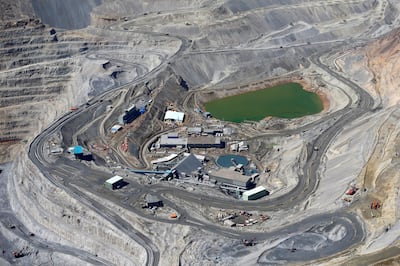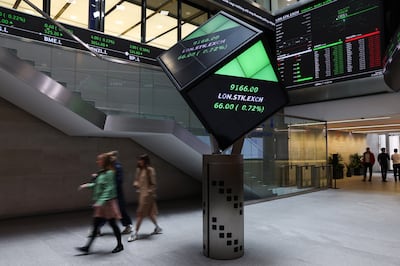London's index of leading shares, the FTSE 100, had an incredible week, reaching all-time intra-day highs and record closing levels day after day.
Support for the FTSE 100 came from several different quarters: raised sentiment over cuts to UK interest rates, a continuing perception that many London blue chip shares are undervalued and a reduction of tension in the Middle East. A takeover bid for one of the market's largest mining companies, Anglo American, came amid an upturn in old-fashioned merger and acquisition activity.
“The FTSE 100 may have raced to fresh highs this week, but it’s been a long time coming, and UK-listed companies are still considered to be undervalued,” said Susannah Streeter, head of money and markets at Hargreaves Lansdown.
Russ Mould, investment director at AJ Bell described the FTSE 100's week as “fantastic” and that the “breadth of sectors moving higher suggests investor sentiment continues to improve”.
On Thursday, the Australian miner BHP, which quit its primary listing in London two years ago, proposed a £31 billion takeover bid for Anglo American, a major member of the FTSE 100.
“Anglo American’s share price is down around 10 per cent compared to a year ago, which is likely to have helped spark the offer,” said Ms Streeter.
“The premium offered by overseas buyers swooping on London-listed firms is seen as evidence that UK assets are still cheap, having been languishing as a result of the Brexit effect and the sluggish performance of the UK economy.”

But as expected, by Friday Anglo American had rejected BHP's offer, with Anglo chairman Stuart Chambers calling it “opportunistic” which failed “to value Anglo American’s prospects”.
Also on Friday, the cybersecurity company Darktrace was bought by private equity firm Thoma Bravo in a $5.32 billion cash deal which served to illustrate further just how valuations on the London market are piquing the interest of suitors.
The price tag for Darktrace, which floated in 2021, represented a 44 per cent premium to the company's three-month average share price, which has doubled in the past year.
'UK remains relatively cheap'
Valuations has been the key buzzword in the market for months. As the US markets tore away into the record-breaking distance, London share indexes have felt very tortoise-like compared to the hares that are their American cousins, the Dow Jones, Nasdaq and S&P 500.
UK shares have been trading at about half the forward earnings ratios of US companies, and there have been rumblings about more corporations setting sail from the London Stock Exchange to New York, following in the paths of the building materials supplier CRH and Paddy Power owner Flutter.
In addition, talk of Shell moving Stateside was ripe a couple of weeks ago when chief executive Wael Sawan repeated his criticism that London was undervaluing the oil company.
The consumer group Reckitt is predicted to be another FTSE 100 company potentially in the crosshairs of a takeover-hungry predator – despite strong earnings and a jump in its share price this week. The stock has underperformed recently mainly because of legal action around one of its baby formula products.
For Richard Hunter, head of markets at Interactive Investor, it will “not have escaped the attention of international investors that the UK remains relatively cheap compared to most global peers”.
“In addition, the possibility that positive moves are afoot in the US away from the mega cap technology shares with investment broadening out towards smaller companies could indicate that investors are increasingly looking for value shares,” he told The National.
'Focus on value'
The famous fund manager John Templeton once advised to “focus on value, because most investors focus on outlook and trends”, which turns out to particularly apt in the current London market.
The outlook has been pretty grim and much of the talk has been of companies fleeing the London stock exchange in search of better numbers elsewhere. But many analysts point out that it is in precisely such bearish conditions, with cheap valuations, where future profits first set sail.
“The valuation potential in the UK market can be seen on an earnings basis, but also a cash yield basis,” Mr Mould told The National.
“The forecast dividend yield is nearly 4 per cent, buybacks are adding another 2 to 2.5 per cent in cash returns and takeovers another 1 to 1.5 per cent, for a cash yield return of some 8 per cent – a figure that beats cash in the bank, government bond yields and inflation,” he added.
Interest rates
Optimism over what will eventually be the first cut to UK interest rates in more than four years buoyed sentiment early in the week.
The Bank of England was the first major central bank to start ramping up interest rates at the end of 2022, and is expected to be the first to start bringing them back down, especially given that inflation in the UK, currently at 3.2 per cent, appears to be heading lower at pace.
Plus, traders on Wall Street have started to factor in a one-in-five chance that the Federal Reserve will raise rates again this year, after some stubborn inflation figures in the US came to light last week.
For Stuart Cole, the chief macro economist at Equiti Capital, the UK's economic picture has changed greatly since the end of last year, when inflation was still being described as “sticky” and “stubbornly high” and the risk of the economy slumping into stagflation was very real.
“Yes, we had a small recession in the second half of 2023, but already data in the first quarter of this year is showing the UK economy is growing again, and more strongly than expected, while the battle to return CPI [consumer price index] back to target has made real progress, to the extent that the UK headline annual rate is now lower than that in the US,” he told The National.
“This improving economic backdrop has put interest rate cuts firmly back on the agenda, with the Bank of England now expected to start cutting this summer.”

Currencies and mathematics
But while sentiment around interest rates and a reduction in the level of tension in the Middle East provided some general support, part of the enthusiasm that drove London shares this week was down to currency strength and weakness – strength of the US dollar and weakness of the British pound.
Two thirds of FTSE 100's earnings come from overseas, meaning when the British pound is weak, it translates into higher relative profits for the market's constituent companies.
“It is just mathematics,” Mr Mould told The National.
“This is particularly powerful as some of the FTSE 100’s biggest earners – Shell, HSBC, BP, Rio Tinto, BAT, AstraZeneca, GSK and Unilever are the top eight, based on consensus analysts’ forecasts for 2024 – all have substantial foreign earnings and between them those eight represent half of forecast FTSE 100 profit on their own.”
Rising commodity prices, a “stronger-for-longer” US dollar and a weak pound create the perfect profit conditions for London-listed mining companies, which is why the likes of Rio Tinto, Antofagasta and Glencore did well this week.

'Sitting ducks'
The irony of a booming stock market that has so many of the big constituents either looking for greener valuation pastures or being potential takeover targets because of low valuations is not lost on traders and analysts.
“Anglo American was a sitting duck,” said Dan Coatsworth, an investment analyst at AJ Bell.
“The London stock market is shrinking fast as companies are either taken over, switch listing to the US or delist to get out of the public’s eye.
“It’s crisis time for the London Stock Exchange as it fights to preserve the integrity of the UK market.”
Some of that crisis, critics argue, is down to the cost of listing in London in the first place. If it's easier to gain access to a much larger pools of capital in New York why, the reasoning goes, would firms looking to go public join the London market?
It's a situation that has raised a few eyebrows, not least those of Michael Mainelli, the Lord Mayor of the City of London, who recently told The National that “we have made listing on them too expensive and some of it is direct national regulation, which requires certain things of listed companies that they don't require of other private companies”.
“Some of it are the rules of the exchange itself. It's up to them to set their rules but there are arguments we could do a lot better to cut down the costs on traded markets,” he added.
Indeed, the London Stock Exchange Group, the company that runs the stock exchange's financial infrastructure, has also been accused of focusing too much on the data side of its business, which critics say was demonstrated by its $27 billion takeover of Refinitiv nearly four years ago.
Nonetheless, shares in LSEG, itself a member of the FTSE 100, have doubled in price since then and at the company's annual general meeting (AGM) on Thursday this week, shareholders voted to double chief executive David Schwimmer's maximum pay to £13 million.
The move went some way to addressing another reason some companies are giving as motivation to delist in London and head across the Atlantic – executive pay. The best-paid chief executive of a FTSE 100 firm last year was AstraZeneca’s Pascal Soriot, whose £16.9 million earnings would not even get him into the list of the top 100 best-paid corporate leaders in the US.

Onwards and upwards?
But the big question is: can the current London stock market rally keep going?
Many market watcher feel the current London rally has legs and that the as the May sunshine breaks through it'll be time to make hay.
“The premier index has hit record highs and now stands ahead by 4.7 per cent in the year to date, outpacing growth of the Dow Jones in the US – up 2 per cent – and yet remaining undemanding in terms of valuation, which suggests that further growth is indeed achievable,” Mr Hunter told The National.
The major US tech stocks of the Magnificent Seven – Microsoft, Apple, Nvidia, Alphabet, Amazon, Meta and Tesla – were the driving force behind the rally in US stocks late last year. But with the Federal Reserve likely to repeat its “higher for longer” mantra at its meeting next week, some analysts feel the tide could be turning in London's favour, given the FTSE 100 is mostly made up of miners, banks, pharmaceuticals and defence companies, which can do better in higher interest rate and inflation environments, especially if they make their money overseas in US dollars.
“That said, no one has a crystal ball,” Mr Mould told The National. “The UK does have valuation in its favour, but it may still need a helpful macro environment if it is to maintain its newfound momentum.”
“For the last decade or more, the environment has been low growth, low inflation and low/zero rates. Perfect for long duration assets like secular growth stocks (tech, biotech) and long-dated bonds for that matter. The US equity market has lots of those, the UK much less. If that environment persists, maybe we get more of the same.
“But if we switch to a higher nominal growth, higher inflation higher rate environment then the picture may change.
“In these circumstances, hard assets (commodities) may do better than paper ones (bonds and cash), and short-duration assets (cyclicals, miners, oil companies) may do better than long-duration ones (technology and biotech) and the UK is much better represented here in absolute and relative terms.”







